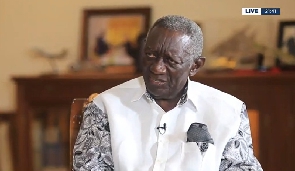Opinions of Friday, 15 May 2009
Columnist: Otchere-Darko, Gabby Asare
Is NDC back to old days, signaling left, turning right
Gabby Asare Otchere-Darko
In typical Orwellian style, the scandal in London today over the MPs and Ministers allowance claims and in Mills' Ghana over ex-gratia, 607 cars and plush lands in Accra can be best described as a political culture reminiscent of the Inner Party in the system of 'oligarchical collectivism' described in George Orwell's classic satire, Nineteen Eighty-Four.
Writing in the Telegraph of London this weekend, Mathew d'Ancona (Editor of The Spectator) said, the ruling Labour Party promised Britons a new era of fair play, but 'Gordon promised so much as custodian of the nation's ethics. He knew that his authority would never flow from novelty or charm. So, flourishing his moral compass, he pledged a system“ governmental and social “ based on fair play… fair play, playing by the rules. This mantra has been at the heart of Brown's political message. And yet his ministers, and even he himself, have made a mockery of that mantra.'
As President Mills and his Foreign Minister were meeting their British counterparts last week, with Alhaji Mumuni holding his palms obediently (like a good African boy before his masters) behind his back, David Miliband was being exposed for claiming £199 for a pram and £80 for 'baby essentials'. Gordon Brown had reimbursed his brother, with whom he shares a Westminster apartment (not No. 10 Downing Street), £6,000 a year from state funds for the cleaning of the flat.
Thanks to the Freedom of Information Act, British taxpayers did not have to wait (like here) for a change of government to find out how their MPs and Ministers are claiming for every expense from £1.60 for biscuits, lilies, carrier bags, lemon, make-up mirrors, toilet seats, nappies, women's toiletries and all to £130k in paying mortgages.
For example, Baroness Thornton, a Labour minister in the whips' office, has been claiming £22,000 a year in expenses by saying that her mother's bungalow in Yorkshire (north) is her main home. As a result the peer, who has a £1m house near Hampstead Heath (London), has been able to claim around £130,000 since 2002. Also, Stephen Byers, the former cabinet¬minister, has claimed £125,000 in expenses for a home which was owned outright by his partner, where he lived rent-free.
The Brits, like us, have grown angrily accustomed to the perception of how senior politicians are milking the system. Their MPs, who get paid between £60,000-£120,000, have selfishly exploited the use of MPs allowances to maximise their personal benefit. Indeed, some buy plush homes, through housing and mortgage arrangements supported by the state, have them furnished and refitted by the taxpayer only to sell them for profit and acquire another one to start the exploitation all over again.
Ironically, in the UK today there is talk of the state building homes for MPs whose constituencies are outside of the capital as a way of stopping them from abusing the allowance system which has the state supporting MPs with payments for their second homes in London. The practical check for the Brits in doing what we do here is the sensible recognition that it would be much more expensive to have state houses for MPs than help them own their own homes. So to them state-built homes is a non-starter.
In the view of Alistair Graham, (chairman of the committee on standards in public life from 2004 to 2007), the fundamental problem is that a culture has developed over many years, where there was a strong sense of grievance about backbench MPs' pay being too low, and therefore a culture slowly developed within the House of Commons of saying: 'Well, if we can't give you the pay, then we'll do what we can to give you a generous expense system.' Yet, the abuses are not by any means limited to backbenchers.
Grahams points out, nevertheless, that there is a complicit cross-party approach where everyone has agreed it is too difficult to do anything about pay, and instead they have concentrated on improving the allowances.
The situation in the UK is not that different here where Ministers and MPs are also relatively poorly paid. I believe we cannot pretend any longer. While it is understood that MPs poor pay is only reflective of a wider national poor-pay system, we can begin the cure with the MPs and Ministers. And, let us move away from this socialist overhang where the state has to provide everything for its senior staff, from homes, through cars to servants.












